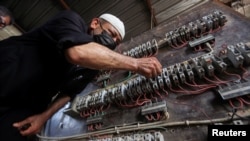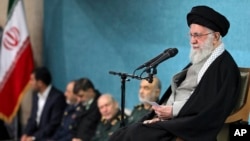
The Trump administration rescinded a waiver on Saturday that had allowed Iraq to pay Iran for electricity, as part of President Donald Trump's "maximum pressure" campaign against Tehran, a State Department spokesperson said.
The decision to let Iraq's waiver lapse upon its expiration "ensures we do not allow Iran any degree of economic or financial relief," the spokesperson said, adding that Trump's campaign on Iran aims "to end its nuclear threat, curtail its ballistic missile program and stop it from supporting terrorist groups."
Trump restored "maximum pressure" on Iran in one of his first acts after returning to office in January. In his first term, he pulled the U.S. out of the Iran nuclear deal, a multinational agreement to prevent Iran from developing nuclear weapons.
The U.S. government has said it wants to isolate Iran from the global economy and eliminate its oil export revenues in order to slow Tehran's development of a nuclear weapon.
Iran denies pursuing nuclear weapons and says its program is peaceful.
For Iraq, the end of the waiver "presents temporary operational challenges," said Farhad Alaaeldin, foreign affairs adviser to Prime Minister Mohammed Shia al-Sudani.
"The government is actively working on alternatives to sustain electricity supply and mitigate any potential disruptions," Alaaeldin told Reuters. "Strengthening energy security remains a national priority, and efforts to enhance domestic production, improve grid efficiency and invest in new technologies will continue at full pace."
Washington has imposed a range of sanctions on Tehran over its nuclear program and support for terrorist organizations, effectively banning countries that do business with Iran from doing business with the U.S.
"President Trump has been clear that the Iranian Regime must cease its ambitions for a nuclear weapon or face Maximum Pressure," said national security spokesperson James Hewitt. "We hope the regime will put the interests of its people and the region ahead of its destabilizing policies."
Pressure on Baghdad
Trump initially granted waivers to several buyers to meet consumer energy needs when he reimposed sanctions on Iran's energy exports in 2018, citing its nuclear program and what the U.S. calls its meddling in the Middle East.
His administration and that of Joe Biden repeatedly renewed Iraq's waiver while urging Baghdad to reduce its dependence on Iranian electricity. The State Department spokesperson reiterated that call on Saturday.
"We urge the Iraqi government to eliminate its dependence on Iranian sources of energy as soon as possible," the spokesperson said. "Iran is an unreliable energy supplier."
The U.S. has used the waiver review in part to increase pressure on Baghdad to allow Kurdish crude oil exports via Turkey, sources have told Reuters. The aim is to boost supply to the global market and keep prices in check, giving the U.S. more room to pursue efforts to choke off Iranian oil exports.
Iraq’s negotiations with the semiautonomous Kurdish region over the oil export resumption have been fraught so far.
"Iraq’s energy transition provides opportunities for U.S. companies, which are world-leading experts in increasing the productivity of power plants, improving electricity grids, and developing electricity interconnections with reliable partners," the State Department spokesperson said.
The spokesperson played down the impact of Iranian electricity imports on Iraq's power grid, saying, "In 2023, electricity imports from Iran were only 4% of electricity consumption in Iraq."






